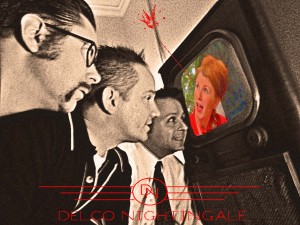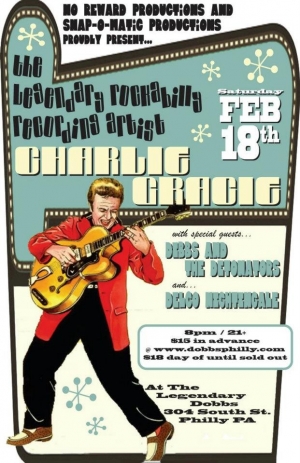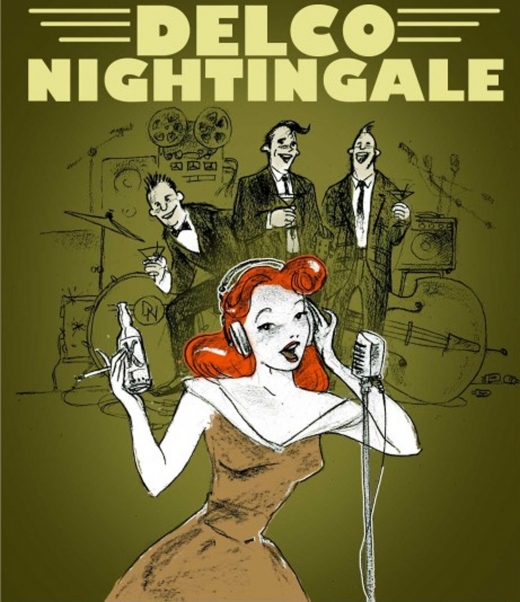 BY MEREDITH KLEIBER If you’ve felt yourself being transported back in time while at a Delco Nightingale show, you are exactly where they want you. The four-piece band — composed of singer Erin Berry, guitarist Greg Phoenix, upright bassist Brendan Skwire, and drummer Eddie Everett — evokes a 1940s-era sound combining elements of swing, rockabilly, and jazz fusion that they top off with a bit of punk-rock grit. If you haven’t yet had the privilege of witnessing the fierce energy delivered by the band during one of their live performances, coif your hair into your best pompadour and get your rear-end over to Dobbs tomorrow night. Phawker recently had the chance to sit down with singer Erin Berry for a beer at Kensington’s own Perry’s Place where we discussed her influences, a new album, and her circumstantial frustration with Delaware County.
BY MEREDITH KLEIBER If you’ve felt yourself being transported back in time while at a Delco Nightingale show, you are exactly where they want you. The four-piece band — composed of singer Erin Berry, guitarist Greg Phoenix, upright bassist Brendan Skwire, and drummer Eddie Everett — evokes a 1940s-era sound combining elements of swing, rockabilly, and jazz fusion that they top off with a bit of punk-rock grit. If you haven’t yet had the privilege of witnessing the fierce energy delivered by the band during one of their live performances, coif your hair into your best pompadour and get your rear-end over to Dobbs tomorrow night. Phawker recently had the chance to sit down with singer Erin Berry for a beer at Kensington’s own Perry’s Place where we discussed her influences, a new album, and her circumstantial frustration with Delaware County.
PHAWKER: How did you come up with the name?
ERIN BERRY: That was a collaborative effort. Delco…
PHAWKER: …Delaware County?
ERIN BERRY: No! That’s what everyone thinks it is. I’m glad we’re getting this in print. I didn’t realize, because none of us are from Philadelphia — I’m from Chicago, Greg’s from Pittsburgh, Brendan is from Rhode Island, and Eddie’s from Delaware — but Delco refers to the old radios. And then the Nightingale, you know, the bird sings. I’m not the nightingale, but it’s a pretty name.
PHAWKER: Did you grow up listening to swing and big band music, or did you start listening to it as you got older?
ERIN BERRY: Well, growing up, my mom and dad had a lot of that stuff in their record collection. I remember after dinner, I think I was probably 5 or 6, when the dishes were done and we’d be relaxing in the living room, they’d turn on the hi-fi. I remember specifically Johnny Mathis, but flipping through the collection, there was also some Sinatra, Lester Lanin and his orchestra, Keely Smith… I remember a lot of the more-cheesed out stuff, but Keely Smith is one of my favorites. They had Ella Sings Gershwin, which I stole and they never got back, and I also stole Keely Smith’s Swingin’ Pretty. Since then, I discovered Betty Hutton, who’s a total goofball. Our first bassist, Sean Thomas, turned me onto her. She was just, like, for lack of a better term, punk rock for the era.  She was a real belter, and she didn’t always sing pretty, like Ella, who is perfect in every sense, and Keely, who is flawless, but a bit simpler. But Betty is just fun and entertaining to watch. I get a lot of inspiration from her. And in the last year, I really gained a lot of appreciation for Anita O’Day. But that didn’t come from my folks.
She was a real belter, and she didn’t always sing pretty, like Ella, who is perfect in every sense, and Keely, who is flawless, but a bit simpler. But Betty is just fun and entertaining to watch. I get a lot of inspiration from her. And in the last year, I really gained a lot of appreciation for Anita O’Day. But that didn’t come from my folks.
PHAWKER: So it’s kind of a mix?
ERIN BERRY: Yeah. It certainly started with my parents, but it continued on in high school. I was in choir and show choir (laughing)… don’t put that in the interview! But my choir teacher exposed me to a lot of standards, so it just kinda kept going and blossomed, obviously, since the older you get, the more people you meet and the more influences you get introduced to. But definitely, my folks started the whole thing.
(And then, like a cheesy biography special, “Hotel California” comes through Perry’s jukebox)
ERIN BERRY: Perfect. And then there’s The Eagles. [sarcastically] Looooove The Eagles.
PHAWKER: “I’ve had a rough day and I hate the fuckin’ Eagles, man”.
ERIN BERRY: [uproarious laughter]
PHAWKER: Anyway, so the way you dress coordinates perfectly with your music. Was it always that way, or did you adapt the way you dress as you started playing more shows?
ERIN BERRY: The first vintage dress I bought was at the local mall in high school. It was a black 1930s dress, very simple with lace sleeves. That started it. I was interested in all the different eras, all mid-century looks. In high school I did a lot of theatrical productions, some of which were period productions, which kinda kept the whole thing going. Fast-forward to 2000, I actually was stuck and wasn’t quite sure what direction to go in. I had been playing in bands since high school, but in 2000, it was kind of a shit-or-get-off-the-pot situation. So I decided to go to New York, do the fashion-design thing, and kind of ignored the music thing for a little while. But I loved theatre and vintage clothes, so I thought costume design would be the perfect melding of the two. I mean, I’ll always wear the clothes, but now, being in a band like Delco Nightingale allows me to wear the fancy stuff, as opposed to just the day dresses.
PHAWKER: I read that you’re working on an album of all original music.
ERIN BERRY: Yeah, we really want to. At last count, we had four or five songs started. The thing with pursuing original music in this genre is that you’ve got composers like Frank Loesser, Hoagy Carmichael, and George and Ira Gershwin who are the pinnacle, and I really want to do the genre justice with any originals that we attempt. First of all, they’re stellar musicians and composers and amazing lyricists, and I’ve been out of the game as far as writing lyrics since 2000, so there’s a little fear getting back into it. We all want to do it, and we all have experience, but it’s about getting serious and sitting down and songwriting together. We’re always finding more gigs where we need more material really quickly, and it’s easy to pick up a song and add it to the setlist, but it takes way longer to write an original and to make it a really good one. It’s in the works, and this is definitely the year for it. We’re really serious about it. We’re hoping to complete it by the end of 2012. Realistically, I don’t think we’ll have 13 originals by the end of 2012, unless we all quit our jobs and focus on writing full-time. But if we do a full-length album for 2012, I’d like to at least see a 50/50 mix of originals and covers.
PHAWKER: So the songs will be a collaborative effort?
 ERIN BERRY: Musically, Delco is very much a democracy. We work well that way, and we all have very valid musical viewpoints and experience and chops, and we feed well off of each other. I can’t imagine our writing being anything but collaborative. It reflects all of our personalities, and we all have something to contribute. Greg has his background of psychobilly and rockabilly. Eddie has a huge rockabilly background too and is a very versatile drummer. He loves to swing. Brendan’s got the punk background. He was really into that in Rhode Island growing up. We all have these four different perspectives that are going to come together, so there’s no reason to try to exclude any one of us.
ERIN BERRY: Musically, Delco is very much a democracy. We work well that way, and we all have very valid musical viewpoints and experience and chops, and we feed well off of each other. I can’t imagine our writing being anything but collaborative. It reflects all of our personalities, and we all have something to contribute. Greg has his background of psychobilly and rockabilly. Eddie has a huge rockabilly background too and is a very versatile drummer. He loves to swing. Brendan’s got the punk background. He was really into that in Rhode Island growing up. We all have these four different perspectives that are going to come together, so there’s no reason to try to exclude any one of us.
PHAWKER: So for this album, when you’ll be writing the songs, or for the songs you’ve already written, do you feel pressured to stay within the boundaries of this genre?
ERIN BERRY: Well, it comes naturally to us and we really enjoy this type of music, so it doesn’t feel confining. We have no interest in writing a reggae song or anything. The kind of music we play is the kind of music that we celebrate and want to continue to celebrate. So there’s no pressure except to make it a good one, not some trite watered-down bullshit.
PHAWKER: How did it feel to open for the legendary Wanda Jackson?
ERIN BERRY: That was so neat. She’s 73, the same age as my mom. And between my mom and Wanda Jackson, they’re two prime examples of how to not seem like you’re 73. She’s got humor and spirit and wit. I don’t really get star-struck, since people are people, but I’m filled with admiration for her longevity and her continued chops. She puts on a great show and did a pretty smart business move by allying herself with Jack White, because, love him or hate him, he’s got the connections and visibility to get someone’s music out there. He did it with Loretta and with Wanda. It was awesome. Really fun. Eddie did a triple-header that night. First we opened up, then he played a set with [Wanda’s backing band] the Lustre Kings, and then the Lustre Kings with Eddie backed Wanda, so his arms were ready to fall off by the end of the night.
PHAWKER: Besides opening for Wanda, what has been your most memorable experience playing with Delco Nightingale?
ERIN BERRY: Well, there’s like four of them poking at my brain. There was the trip out to Vegas and LA, which was great because we were traveling so far from our base.
PHAWKER: For the Turner Classic Movies Film Festival?
ERIN BERRY: Yeah, there were two gigs on that trip. We played Viva Las Vegas, which was fun. It’s a three-day festival, and they featured pretty much all the eras — rockabilly, doo-wop, swing — Jerry Lee Lewis played, The Blasters played. That was funny, because we had just played with The Blasters in February. Then we went to the Turner Classic Movies Film Festival in Hollywood. I couldn’t even lift my head, I was so busy looking at all the stars on the sidewalk. We had a few outings, but most of the time we were just rehearsing our brains out for our first three-set gig. Opening up for The Blasters was great, too. I had lots of beers that night. After the show, we were hanging out with Phil Alvin. Greg and I posed for a picture with him, and I apparently had enough beers to grab Phil’s bottom. And I kept apologizing for it, but he was very gracious. He was like, “your husband’s on the other side!” But he was really cool about it. They’re all good experiences. Even just playing for a room of 10 people. All gigs are good gigs.
PHAWKER: What do you see in the future for the band?
ERIN BERRY: World domination! No, it’s interesting, because I know the validity of the music we’re playing, and our philosophy — recording totally live,  with none of this studio pixie dust, no pitch shifting, none of that garbage. People love the pop music, but it seems to be that with shows like Mad Men, True Blood, and other popular shows right now, you’re also hearing this period music. Paul McCartney just came out with an album of standards, and Joan Osborne has a new album out with some old blues tunes on it, for example. There’s a huge backlash and roots music is being recognized again. We’ve been at it for four years now, and we’re not bandwagon-jumpers. I’ve wanted to do a project like this for years, and it finally came together when Greg and I moved to Philly. I think it’s really important that this music continues to live on, and the way it will is when a new audience — young people — hears it. I think the way we deliver and the way we rearrange it, making it a bit more rock-and-roll with a rockabilly kind of lineup, if we see huge success that’d be great, but if we can get people who wouldn’t normally hear this music to get down to it, that’s great. We did our part to keep the music alive.
with none of this studio pixie dust, no pitch shifting, none of that garbage. People love the pop music, but it seems to be that with shows like Mad Men, True Blood, and other popular shows right now, you’re also hearing this period music. Paul McCartney just came out with an album of standards, and Joan Osborne has a new album out with some old blues tunes on it, for example. There’s a huge backlash and roots music is being recognized again. We’ve been at it for four years now, and we’re not bandwagon-jumpers. I’ve wanted to do a project like this for years, and it finally came together when Greg and I moved to Philly. I think it’s really important that this music continues to live on, and the way it will is when a new audience — young people — hears it. I think the way we deliver and the way we rearrange it, making it a bit more rock-and-roll with a rockabilly kind of lineup, if we see huge success that’d be great, but if we can get people who wouldn’t normally hear this music to get down to it, that’s great. We did our part to keep the music alive.
PHAWKER: Okay, last question. When I saw you guys play, I was amazed by the amount of energy emitted by your performance. Is there any specific routine you follow before the shows to get yourself pumped up?
ERIN BERRY: COCAINE! (laughing) No, seriously though, there’s nothing special that we do. It’s just how much we like that music. It’s just exciting. It’s fun; we really enjoy each other. A lot of the songs — probably close to 80% — are up-tempo or goofball. And we’ve achieved a comfort level with each other where we can really have fun up there. It’s fun with the audience, too. I’ve reached a point now where I’m comfortable enough with the songs where I can say some shit to people in the audience and pick up right where I left off. I really want our shows to feel like we’re playing for you in your living room. Kind of like the intimacy that Keely Smith and Louis Prima had when they were playing in the 50s. They were playing, I believe the Stardust, and the Rat Pack guys would come see them play, and Louis had a great banter back and forth with the audience, and they’re goofing with each other all the time on stage. They’re so tight and so loose all at the same time, which just shows the mastery that they all had at their craft. If we could even come close to what they achieved, I’d be pretty proud.

